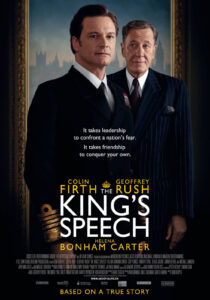 The King’s Speech is a true story based upon how King George VI became the King of England after his father, King George V, died and his older brother David decided to abandon the throne to be with the woman he loved. George VI (aka Bertie to his closest friend) reluctantly takes over as King of England despite his stammering problem and utter fear of speaking in public.
The King’s Speech is a true story based upon how King George VI became the King of England after his father, King George V, died and his older brother David decided to abandon the throne to be with the woman he loved. George VI (aka Bertie to his closest friend) reluctantly takes over as King of England despite his stammering problem and utter fear of speaking in public.
To help overcome his disability, Bertie (Colin Firth – A Single Man, The Importance of Being Earnest) tries various techniques and visits numerous specialists. It is not until the King meets speech therapist Lionel Logue (Geoffrey Rush – Shine, Frida) that he begins to see progress. The two are very different from each other. The King is cold, aloof, often highly stressed, and short-tempered. It makes him unlikeable at times. On the other hand, Lionel is charming, friendly, funny, and patient. You like him from the moment you meet him. The contrast between the two characters makes them work well together.
Making a historical movie such as this so appealing and entertaining to a wide variety of people is an accomplishment in itself. Tom Hooper’s (The Damned United, Longford) direction was deliberate but never slow, calculated but not robotic. Its characters were zany, likable, and, most importantly, believable. Geoffrey Rush, whom I’ve never really enjoyed, was excellent. He orchestrated this movie. He set the tone. He set the pace. In a way, King Edward was Lionel’s puppet. Lionel molds Bertie from an unlikable aristocrat to a humbled and gracious everyday man. Helen Brohm Carter (Charlie and the Chocolate Factory, Planet of the Apes) was perfect as Queen Elizabeth. She was a patient and loving wife. She put his needs before her own. She knew how important the King needed to be during the war. The Queen sought help for her husband when he was too ashamed to pursue it himself.
In the movie’s climax, as Edward walks through his palace, passing his friends, family, and supporters toward the room where he will deliver his speech, it feels like you are watching him walk toward the electric chair. You have been there with him as he worked tirelessly to improve his speech. So much drama had been built up by that point that you felt like you would either triumph with the King if he was successful in his delivery or painfully suffer with him if he failed.
Firth was the front-runner for winning the Best Actor Academy Award long before his movie, The King’s Speech, even reached the general public. His performance as King George VI was so powerful that his eventual win was the one “lock” that critics and voters worldwide could agree upon. What the critics and general public deemed to be a mystery was whether or not the movie would win Best Picture. Had Firth’s performance not been so jaw-dropping, the movie probably would have been beaten out by what many deemed the second-best movie of the year, The Social Network. There was no denying Firth, however. The King’s Speech captured Best Picture, Best Actor, Best Director, and Best Writing for an Original Screenplay. It also landed Rush and Bonham Carter nominations for Best Supporting Actor and Best Supporting Actress, respectively.
I saw nine of the ten movies nominated for the 2010 Best Picture Academy Award. The one that I was not interested in seeing was Toy Story 3. Eight of the nine movies were deserving of their nomination. Winter’s Bone wasn’t in the class of the others. I also felt like Shutter Island should have received some more love. It was a fabulous movie. Martin Scorsese ell directed it well. Its star, Leonardo Dicaprio, might not have had as strong a performance as the five nominees, but he did a fabulous job in that movie.
With all of that said, two movies left a pleasant taste in your mouth. Both were based on true stories. The King’s Speech, with its leading character overcoming a disability to lead a nation during a time of war, was fantastic. You saw how hard the King worked at attempting to defeat his disability. You rooted for him. You sat on the edge of your seat as he gave his speech. Upon its successful conclusion, you breathed a sigh of relief. These emotions were genuine. Naturally, this is going to translate into many accolades. However, I do not want to discredit 127 Hours. That movie was even more successful in having the audience root for its main character, suffer with him in pain, and believe in him when he feels physically, emotionally, mentally, and spiritually drained. As the credits rolled at the end of 127 Hours, I felt happy to be alive. I felt joy. I felt inspired to do more with my life. While Franco’s performance was good, it was not as great as Firth’s. However, much like the 2010 winner for Best Actor, the 2010 host of the Academy Awards proved he also belongs with the Hollywood elite. I have no issue with The King’s Speech winning best picture. Rather, I wonder how 127 Hours would have fared in a different year.
Plot 10/10
Character Development 10/10
Character Chemistry 10/10
Acting 10/10
Screenplay 10/10
Directing 10/10
Cinematography 8/10
Sound 10/10
Hook and Reel 8/10
Universal Relevance 9/10
95%